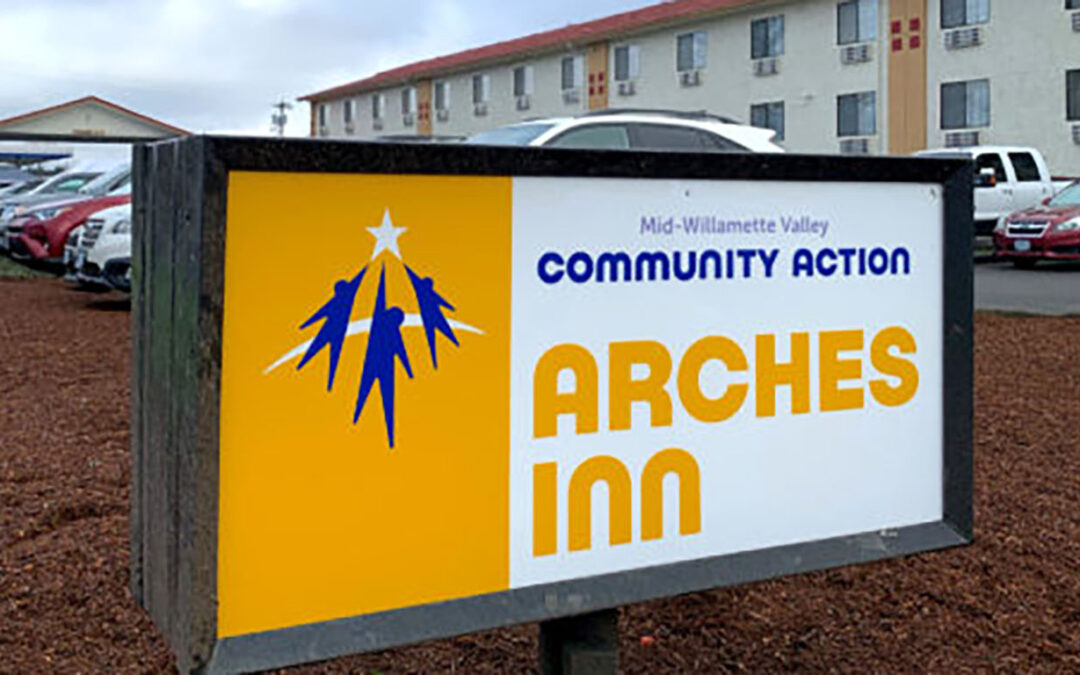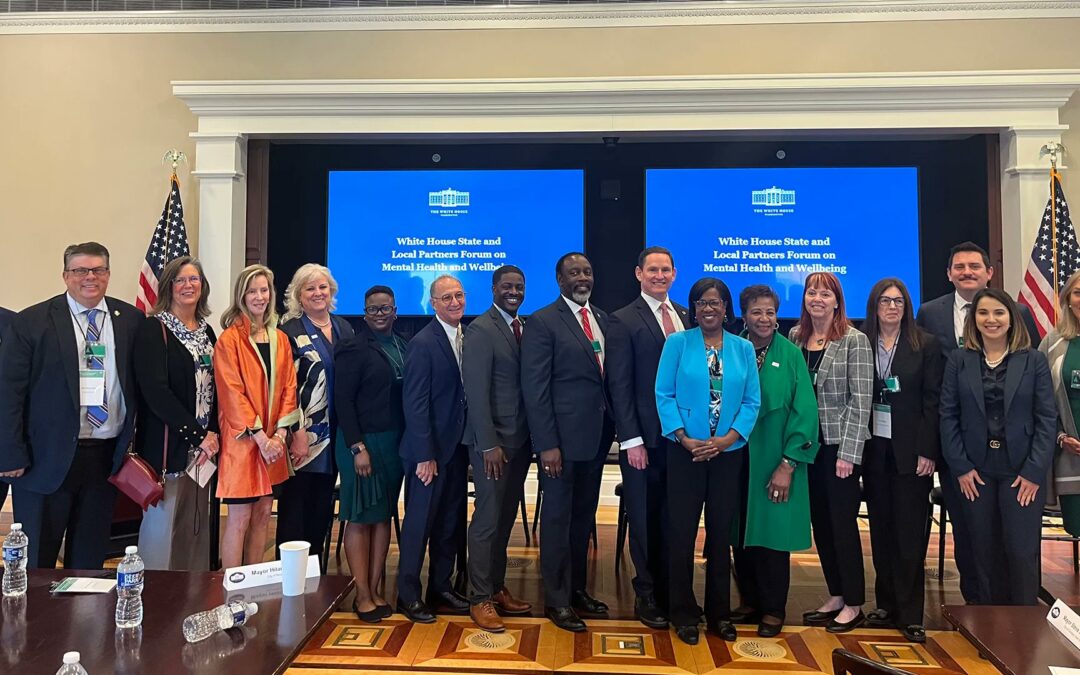
Jun 14, 2023 | AOC Advocacy, AOC News, Natural Resources
The Association of Oregon Counties (AOC) has continuously engaged with the legislature, state agencies, and stakeholders in the development of comprehensive wildfire policies for numerous sessions. By focusing on thoughtful, effective, and regionally tailored wildfire policy, AOC has been able to ensure the county perspective is not only at the negotiating table but included in the implementation of statewide policy on wildfire.
Senate Bill 80B (2023) makes many technical changes to the 2021 Wildfire bill, SB 762, including revisiting the statewide wildfire risk map. Based on AOC Natural Resources Steering Committee principles and discussions, AOC staff and steering committee chairs worked with bill sponsor Senator Jeff Golden (D-Ashland), the Oregon Department of Forestry (ODF), and Wildfire Program Advisory Council Chair Mark Bennett and Director Doug Grafe on statutory changes with the goal of an improved statewide wildfire hazard map.
Upon passage of SB 80, statute now requires that, “to ensure local characteristics in each area of this state are considered in the mapping process and before the draft map is released, the department shall meet with county commissioners and their staff in eight in-person meetings throughout this state.”
The bill goes on to say that after those meetings occur and the map is released for public comment, counties will have one additional opportunity to meet with ODF to discuss additional concerns and potential changes to the map. This process must be “interactive and does not consist solely of delivering information in a top-down manner.”
Finally, to ensure that counties have an active role in the wildfire mapping process, ODF stated on the legislative record that, “The department will receive and consider all comments and concerns for integration into the map, and if they are not integrated, an explanation on why will be provided.”
These county-ODF meetings will be scheduled in coordination with the AOC District Meetings this fall. AOC staff is meeting with county planning directors in advance of the fall ODF meetings to ensure counties are prepared to engage meaningfully in the map review process.
“We look forward to meeting with county commissioners and staff as we put the Wildfire Hazard Map together later this year,” said Cal Mukumoto, Oregon State Forester. “Through working together with counties we were able to craft language that works for both parties. Knowing the local concerns and issues faced in specific areas will help us make a map that is beneficial statewide.”
Contributed by: Branden Pursinger, AOC legislative affairs manager

Jun 2, 2023 | AOC News
There has been a lot of talk about housing as the Kotek Administration prioritizes solutions to the state’s housing crisis. Project Turnkey, an Association of Oregon Counties (AOC) supported program, is one of several models being deployed to provide targeted solutions tailored to community needs.
Last month, Oregon Governor Tina Kotek joined Polk County Commissioner Jeremy Gordon, AOC Executive Director Gina Firman Nikkel, and community leaders for the ribbon cutting of the Project Turnkey property, ARCHES Lodge in northeast Salem.
ARCHES Inn, a former hotel, was purchased by Mid-Willamette Valley Community Action Agency (MWVCAA) using grant funding from several sources, including $3.5 million from the second tranche of Project Turnkey’s investment from the state. The region has identified veterans and people with acute health needs, including unsheltered people being released from clinics or emergency rooms, as its priority population for shelter and services.
True to the intent of the program, each local community focuses on specific housing and services tailored to the needs of their guests. Some recipients of the funds used the program to uplift community members impacted by wildfire, some for those transitioning following substance use recovery, some for transitional housing for youth, and some for survivors of domestic violence.
Since 2020, the State Legislature has invested close to $125 million in Project Turnkey. In the first tranche of funding, the program added nearly 900 units of shelter for Oregonians in need through the conversion of 19 motel sites in 13 counties around the state. In the second tranche of funding, which is being deployed through June of 2023, it is expected that an additional 500 units of shelter will be created.
“Project Turnkey was really a culmination of the pandemic, wildfire, and general housing crisis in Oregon. And, with my background in mental health, and the work that counties do to support our residents through wraparound services, it was clear that housing was one of the first critical steps in addressing mental health needs for Oregonians,” Nikkel said.
Following that conversation, AOC formed and co-convened a workgroup with the League of Oregon Cities (LOC), inviting legislators and other housing stakeholders to the table to identify how to achieve solutions that best served Oregonians. Oregon Community Foundation (OCF) staff engaged in the convening and feasibility study of the model. Ultimately, OCF served as fiduciary and grant administrator for the implementation of the program. This group worked closely with Kotek, who, at the time, served as Speaker of the House, for the initial investment in the program.
Nikkel is grateful for the governor’s engagement with the program. “Governor Kotek was a strong advocate for the program in her tenure as Speaker of the House and now as governor. She continues to be a strong partner for counties.”
With the strong success in the first phase of the program, Project Turnkey saw an infusion of $50 million more from the state in 2022. Organizations around the state applied for the opportunity to purchase motels, hotels, and other existing structures and utilize them short-term as shelter or temporary housing. Longer term, the properties may convert to permanent housing as the local housing needs shift and evolve.
OCF, the administrator of Project Turnkey, is continuing its work, guided by a statewide Advisory Committee. The second tranche of $50 million in funding is being awarded to new sites around the state, and in alignment with legislative direction for the funds, all acquisitions will be completed by June 30, 2023.
Eligible property types include hotels, motels, and other vacant properties that can readily and affordably be converted to non-congregate shelter such as duplexes, apartment complexes, care facilities, or dormitories.
Nikkel serves on the Advisory Committee that reviews Project Turnkey applications and recommends awardees for funding. She said the second tranche of funding brought 32 applications from regions around the state.
“The need for housing is great, and while Project Turnkey is one of several pieces needed to address the housing crisis, it is not the only set of housing we need, Nikkel stated. We need people to move up – from shelter beds to middle housing, and so on.”
There was no direct request for funding for the 2023 Legislative Session, but conversations continue. Nikkel met with Kotek in early April and discussed the success of the program.
As Project Turnkey properties launch in communities around the state, counties are working with community partners to provide wraparound services to program participants. Each site is uniting community partners to offer the right resources to each guest to help them stabilize and move to permanent housing.
AOC, LOC, and partners continue to convene to address future housing solutions. Partners include: CASA of Oregon; Hacienda CDC; Network for Oregon Affordable Housing; Oregon Emergency Management; Oregon Community Foundation, Oregon Health Authority; Oregon Housing and Community Services; Oregon Restaurant and Lodging Association; Oregon Community Foundation; Oregon Housing Stability Council Chair and Lincoln County Commissioner Claire Hall; former Morrow County Commissioner Jim Doherty; State Representative Pam Marsh (D-Ashland); and former State Representative Alissa Keny-Guyer (D-Portland).
Contributed by: Mckenzie Farrell, AOC operations director

Jun 1, 2023 | AOC Business Partner
During the 117th Congress, lawmakers passed record investments in infrastructure and climate change reduction. The investments include a significant amount of money available directly from the federal government and through state mechanisms to local government, non-profit, and business entities. Information about accessing these available funds continues to be developed and disseminated.
In coordination with Governor Tina Kotek’s office, key faculty and staff with University of Oregon’s Environment Initiative are helping to raise awareness by coordinating a briefing with the latest information about the recent federal Inflation Reduction Act (IRA) and the Infrastructure Investment and Jobs Act (IIJA) that provide billions of dollars in incentives, grants, and loans to support new infrastructure investments in the areas of clean energy, sustainable transportation, and other efforts to address climate change.
Even those who have participated in similar briefings on the same topic are encouraged to attend, as new details continue to be released about the nature of these investments.
When: Friday, June 16, 9 am – 12:30 pm PST
Information and registration link at: https://environment.uoregon.edu/IRAconvening
The webinar is hosted by representatives from the University of Oregon Environment Initiative, a campus-wide coordinated effort to create an intellectual and active hub focused on higher education’s role and contribution to a just and livable future. The Environment Initiative aims to leverage the intellectual energy and endeavors of faculty, students, and community partners towards societal contribution through transdisciplinary research, teaching, and experiential learning.
Agenda: With facilitation by UO School of Law, Office of the Vice President for Research and Innovation and Lundquist College of Business experts, representatives from federal and state agencies along with other experts will serve as panelists to help outline the benefits that this investment can provide to Oregon businesses, government entities, and citizens.
- UO Environment Introductory Comments –Adell Amos, UO Clayton R. Hess professor of law and executive director, UO Environment Initiative
- Welcome – Governor Tina Kotek
- Overview Presentation – Greg Dotson, UO associate professor of law, Senior Faculty Fellow Environment Initiative
- Panel 1: Federal Implementation – An overview of federal incentives with representatives from US Department of Energy, US Environmental Protection Agency, US Housing and Urban Development, and US Department of Agriculture.
Moderated by Anshuman Razdan, Vice President for Research & Innovation, Professor, Department of Computer Science, College of Arts and Sciences
Margaret Hoffman, USDA State Director for Oregon (confirmed)
Kat Compton, US EPA Region 10 (confirmed)
Margaret Salazar, US HUD (confirmed)
US DOE (invited)
- Panel 2: State Implementation – Discuss the status of state efforts with representatives from Oregon Department of Environment Quality, Oregon Department of Energy, and Oregon Department of Transportation.
Moderated by Alai Reyes Santos, Professor of Practice, School of Law, Co-Director, PNW Just Futures Institute
Janine Benner, Oregon Department of Energy (confirmed)
Colin McConnaha, Oregon Department of Environmental Quality (confirmed)
Travis Brouwer, Oregon Department of Transportation (confirmed)
- Panel 3: Federal Tax Opportunities – Overview of IRA tax provisions
Moderated by Joshua Skov, Academic Director, Center for Sustainable Business Practices, Lundquist College of Business
Mike Kaercher, Director of the Climate Tax Project, The Tax Law Center at NYU Law (confirmed)
Michael Such, Stoel Rives (confirmed)
Contributed by: The University of Oregon
*Sponsored content provided by AOC Business Partner.

May 31, 2023 | AOC Business Partner
The night before CIS’ Virtual Conference in February, the Willamette Valley experienced significant snowfall that prevented some staff from making it to the studio to participate live in the conference. Thankfully, CIS’ conference planner had pre-recorded some of the presentations, which made the annual conference move forward smoothly, despite the snow. More than 400 people attended, and based on the post-conference survey, nearly all appreciated the expert speakers and informative sessions. Each conference session is still available and can be viewed in the CIS Learning Center.
With the popularity of the virtual conference, it wasn’t surprising that the overall conference was rated 91% Excellent/Good. Many attendees took the time to comment about the conference.
You guys continually amaze me. While in-person you usually exceed expectations too, your virtual conferences are by FAR the best that I’ve experienced, and this one was no exception. Fast paced and packed with important/relevant/timely info. Can’t thank you enough!
Very well explained and the presenters were well prepared.
Glad that it was a virtual event for many reasons: because of the weather conditions, the expense of traveling, time away from the office and limiting group exposure to any type of virus going around. Participants get the information they need for budget purposes sooner.
Given the weather, first of all, everyone must be congratulated for making this go off without a hitch! The technology and the music were just right.
Perfect kind of event to announce rates! Appreciated the bullet point style way of taking about the categories of risk that affect rates.
Learned about the current pressures on rates and why they are increasing.
Virtual Conferences are challenging, and the CIS crew did an amazing job (as usual)!
I thought it was great and informative and everyone did great, considering the snow/changes in venue due to the weather.
Looking Back at 21 years of CIS Conferences
After the many complimentary comments received about CIS’ February virtual conference, they reflected on how this signature event has changed over time. CIS launched their first Annual Conference back in 2002. It began as the “Annual Meeting and CIS Risk Management Conference.” The purpose was to increase member involvement in CIS activities. It also served — and continues to serve — as the annual membership meeting as required by CIS’ governance policy.
Today, the conference highlights the coverages and plans available to members, provides updates on changes that affect our communities, and educates attendees about ways to avoid claims and control losses. Because risk management and pre-loss are core functions of our operations, they’re featured prominently. It’s about fostering good risk management practices that lead to reduced claims so CIS can keep rates stable. It’s important to help counties protect their financial health, so the CIS conference packs the most risk management education into a single event.
The event represents CIS’ mission, vision, and values in a single event.
MISSION: CIS provides property, casualty, and employee benefit solutions tailored to the needs of Oregon’s cities and counties.
VISION: Together, CIS helps Oregon’s cities and counties to be safer, stronger, and healthier.
VALUES: Financial strength, innovation, expertise, adaptability, collaboration, integrity, and diversity and inclusion.
CIS sat down with their Communications, Events, and Projects Manager Julie LaMarche, to learn more about how the conference has evolved since 2001. Besides managing and producing the conference, LaMarche manages CIS’ communications efforts, including reviewing, editing, and designing publications, announcements, and presentation materials.
Q: When did you become involved in the planning for the CIS Annual Conference?
A: When I started at CIS in 2005, the conference was coordinated by CIS’ Executive Assistant, who led an internal conference committee. Later in 2007, it was taken over by two CIS staff. When they left CIS — two months before our 2009 conference — I was asked to step in. I’ve organized the conference ever since.
Q: How has the conference evolved over time?
A: When I started 17 years ago, the conference was held at the Embassy Suites near Washington Square in Tigard. Similar to today, it was held in February, and we offered one complimentary registration and covered one-night hotel stay for every member.
The 1st Annual Meeting and CIS Risk Management Conference was held in 2002 at the Ramada Inn & Suites near the Portland Airport. Prior to 2002, the conference was like a road show. It was similar to our Fall Supervisor Training series, where our presenters traveled around the state and held sessions regionally.
In 2007, we introduced electronic survey evaluations. In 2010, we went green by discontinuing handing out large binders for each attendee, and instead provided them with electronic copies of the presentation materials.
In 2011, we celebrated our 30th Anniversary and 10th Annual Conference by introducing longevity awards of 20, 25, and 30-years for those Members who had continuous coverage with the CIS Property/Casualty Trust. Later in 2016, 35-year awards were created, and 40-year awards were added in 2021.
In 2012, we introduced a conference mobile app, and started recording select sessions so members and agents could watch sessions they missed. We also introduced a 4th track for law enforcement/public safety.
In 2016 we began live-streaming select sessions so members and agents could still receive pertinent information from the convenience of their desk.
In 2017 the law enforcement track split off and we created a new conference for public safety.
In 2020 we introduced the Shark-Tank session, awarding grants of $1,000, $2,500, and $5,000 for innovative safety-related programs.
In 2021, due to the pandemic, we held a three-day all virtual conference.
By 2022, we transitioned to a fully hybrid conference where members and agents had the flexibility of attending in person, virtually, or a combination of the two.
Q: How do you see our conference evolving after the pandemic?
A: I think there will be more demand for all events — conferences, trainings, workshops, meetings — to be hybrid.
I know people have missed meeting with each other in person because they appreciate the higher level of engagement. It’s been difficult to achieve when meeting virtually. Members have told us that they enjoy attending sessions, sharing meals, networking, and interacting with CIS employees.
Other Members have told us that they truly appreciate the flexibility of being virtual — while some of our smaller-county members have said they like signing in remotely because they don’t have the budget to travel, or they don’t have anyone to cover for them while they’re out of the office.
The pandemic has shown that we can offer both options.
Q: Where do you see our conference 5 to 10 years from now?
A: We’ll continue to seek member input and innovate. Just like in the past, we will find ways to improve the conference. One thing that I’m confident about is that we will give people the option to attend in-person or online. It’s really about how we can best serve our Members and Agents.
Q: What do you enjoy most about the conference?
A: It’s all about making the conference valuable, educational, and enjoyable for members, our partners, and agents. What I enjoy most is striving to make it better than the year before. I also really enjoy working with each CIS employee, as they are key in making the event successful. I know that attendees really enjoy interacting with them. Those personal connections make our conference almost like a family reunion.
Contributed by: Bill LaMarche | CIS Public and Member Relations Manager
*Sponsored content provided by AOC Business Partner.

May 19, 2023 | Governance, Revenue, & Economic Development
As Oregon prepares applications for hundreds of millions of dollars in federal infrastructure funds that Congress made available through the American Rescue Plan Act and the Infrastructure Improvement and Jobs Act, the state legislature is doing its part.
HB 3201, sponsored by Rep. Pam Marsh and Sen. Aaron Woods, will fix conflicts between state law and federal rules that could have significantly reduced the amount of federal broadband infrastructure funds Oregon qualifies for. Considering the hardships facing anyone who does not have good internet access today, and the tremendous difference better internet will make for communities across Oregon, passing HB 3201 has been a huge priority for AOC this session.
In terrific news, the bill cleared one of its final hurdles on Tuesday, May 9th, passing out of the Senate Committee on Veterans, Emergency Management, and Federal and World Affairs. It now moves to the Senate Floor, where it is expected to pass. On its way to the governor’s desk, the bill will make one more stop in the House for a concurrence vote, where it is nearly certain to succeed after having passed that chamber with a strong bipartisan majority in March.
HB 3201 initially faced an uncertain path due to fierce opposition from a couple of special interest groups. Many people and organizations contributed to this effort, which began last summer, when Rep. Marsh convened dozens stakeholders to collaborate on solutions, meeting multiple times over a period of months. Sen. Woods, the bill’s other chief co-sponsor, deserves special appreciation for his leadership in reaching an agreement that eliminated all known opposition to the bill, giving it an even better chance of passing. In a glaring oversight, Sen. Woods’ efforts were not acknowledged in AOC’s testimony to the Senate committee earlier this month, a lapse we sincerely regret.
AOC will continue to watch HB 3201’s progress closely, as well as ongoing efforts by the Oregon Broadband Office to obtain the federal funds and get grants out to communities.
Contributed by: Michael Burdick | Legislative Affairs Manager

May 17, 2023 | AOC Business Partner
With each passing year, Post Traumatic Stress Disorder (PTSD) has become more prevalent with first responders. Join CIS experts as they address this issue and many other public-safety-related topics during the Annual Public Safety Conference, Aug. 9-11 at Salishan Coastal Lodge (Gleneden Beach). Registration for this event is FREE for those members with CIS general liability coverage.
The three-day conference will highlight many issues, including employment-law trends, trauma training, and social media best practices for command staff and public information officers (PIOS). In addition to the high-quality training, attendees will receive 15 DPPST credits, and valuable networking opportunities with public-safety leaders from across the state.
Additional agenda items include:
Wednesday, Aug. 9
Early morning Golf Tournament (networking opportunity)
Tactical Trauma Training (Parts 1 and 2)
You Are Never Alone — A Personal Story of Survival, Courage, and Vulnerability
In part one of this session, Jared Nesary, a retired officer from Yakima Police Department, shares his personal battle with PTSD and what healing looks like after residential treatment. His courage to ask for help, in his words, saved his life and career. “You are never alone” is a personal story of survival, courage, and vulnerability. Jared survived PTSD and won his life back.
Understanding PTSD/PTSI and How it Affects Us All
In part two of this session, Matt Quackenbush, LCSW, shares the latest research and techniques in Neuroscience, Traumatology, and Psychology. Discover the basics of the neurobiology of trauma, how it changes the physical structure of the brain, and the way the body responds to threats and stress. Quackenbush shares cutting-edge treatments from the field of Traumatology and easy-to-use techniques to change the way one’s brain and body respond to threats and stress.
Thursday, Aug. 10
Civil Litigation Trends
In recent years there’s been an explosion of public-safety-related litigation. CIS’ Supervising Litigation Attorney Dave Lewis shares an update about important federal cases — along with an overview of Oregon-specific law-enforcement cases and their outcomes.
Employment Law Trends
CIS’ Deputy General Counsel Tamara Russell shares recent changes in employment law that are important to public safety employers. Attendees will learn how new case law and arbitration decisions will impact their organizations, and how to use those cases/decisions to avoid legal pitfalls in the workplace.
Public Safety Wellness Best Practices Panel
Learn more about comprehensive and innovative wellness practices from several member agencies. Panelists will explore issues surrounding funding, organizational acceptance, and research, among other topics.
Improve Employee Commitment by Building Trust
Public-safety leaders learn practical trust-building strategies to help employees transition from compliance to commitment. Discover the techniques that help improve employee morale, accountability, and performance. By the end of the 4-hour session, attendees will have professional strategies on how to effectively engage with employees to build trust, provide continuous accurate feedback, show appropriate appreciation, and help create a work environment where motivation can thrive.
Friday, Aug. 11
Strategic Social Media Practices for Command Staff & PIOS
The most successful law enforcement agencies are using public messaging proactively — long before any crisis strikes — to build positive relationships with their communities. Designed for leaders who oversee the public message, this fast-paced presentation takes attendees through social media strategies to tell their agency’s story and with interacting traditional media to amplify their message.
Topics include:
- Understanding Legal Considerations for Government Social Media
- Recognizing Good News Stories That Resonate
- Proven Social Media Strategies
- Navigating Negativity
- Building Mutually Beneficial Relationships with the Media
Telling good news stories helps the organization and the community. Learn how to do that intentionally from an Emmy-award-winning former Washington, DC, area reporter, who also served as a PIO for two of the nation’s largest police departments.
Travel and overnight expenses are the responsibility of each attendee. CIS has negotiated a discounted group rate at the Salishan Coast Lodge of $289 plus tax, per night. Guest reservations and room charges are the sole responsibility of the attendee. Hotel reservation instructions will be provided once registration for the event is live.
For more information about the Public Safety Conference, visit cisoregon.org/publicsafety.
Contributed by: Bill LaMarche | CIS Public and Member Relations Manager
*Sponsored content provided by AOC Business Partner.

May 10, 2023 | Federal News
Today, as part of Mental Health Awareness Month, Julie Chavez Rodriguez, Senior Advisor to the President and Director of the White House Office of Intergovernmental Affairs, and Christen Linke Young, Deputy Assistant to the President for Health and Veterans Affairs in the White House Domestic Policy Council, convened representatives from state and local government for a Forum on Mental Health and Well Being. Department of Health and Human Services (HHS) Secretary Xavier Becerra and senior White House officials participated in the convening.
Tackling the mental health crisis is a key pillar of President Biden’s Unity Agenda. The Administration has focused on advancing the President’s Mental Health Strategy across its three objectives: strengthening system capacity, connecting more Americans to care, and creating healthy and supportive environments. As part of that work, the Administration has expanded access to mental health services, investing billions of dollars through the American Rescue Plan and the Bipartisan Safer Communities Act, and has proposed tens of billions in further support in his budget request for FY 2024.
During the Forum, Secretary Xavier Becerra laid out the whole-of-society response to this crisis, including the Department’s launch of 988, the National Suicide & Crisis Lifeline, and FindSupport.gov, as well as the expansion of mental health services to support youth in schools and in communities. Senior White House staff, mayors, county elected leaders, and representatives also discussed how Medicaid waivers can be leveraged for comprehensive mental health service provision and how important investments are being made to grow and diversify the behavioral health workforce.
Senior White House staff thanked state and local leaders, and the National Governors Association (NGA), National League of Cities (NLC), and National Association of Counties (NACo) for their leadership and affirmed the Administration’s support and partnership in addressing the mental health crisis.
Participating state and local leaders in attendance included:
- Dr. April Aycock, Director, Office of Mental Health , Monroe County, New York
- Kathryn Barger, Supervisor, Los Angeles County, California
- Mary Ann Borgeson, Commissioner, Douglas County, Nebraska
- Dr. Kathleen Burke, Director, Will County Health Department, Will County, Illinois
- Therese Brown, Commissioner, Allen County, Indiana
- Dow Constantine, County Executive, King County, Washington
- David Crowley, Executive, Milwaukee County, Wisconsin
- Bryan Davis, Commissioner, Scioto County, Ohio
- Jerry Demings, County Mayor, Orange County, Florida
- Clay Jenkins, Judge, Dallas County, Texas
- Sherman P. Lea, Mayor & NLC Cities of Opportunity Initiative, City of Roanoke, Virginia
- Steven Leifman, Judge, Miami Dade County, Florida
- Dr. Gina Nikkel, Executive Director, Association of Oregon Counties
- Hillary Schieve, Mayor & Incoming President of U.S. Conference of Mayors, City of Reno, Nevada
- Dr. Laura Herrera Scott, Maryland Health Secretary
- Helen Stone, Commissioner, Chatham County, Georgia
- Steve Williams, Mayor & NLC Health Committee, City of Huntington, West Virginia
- Denise Winfrey, National Association of Counties (NACo) President, Will County, Illinois
Source: The White House

May 10, 2023 | AOC Business Partner
Last year, the CIS Board approved hiring a Cyber Risk Management Consultant to help Members prevent cyberattacks. So far, the investment is paying off with fewer cyber claims in 2022. This has led to no premium increases for CIS’ first two tiers of coverage and a 5% increase for Tier 3.
Members who have cyber coverage through CIS receive free cyber security consulting from CIS’ in-house IT expert. CIS’ coverage is tailored to counties, and often better than what can be secured from the for-profit insurance market.
To encourage CIS Members to sign up, CIS has reduced the eligibility requirements from last year so more Members can qualify. When counties have CIS cyber coverage, they receive free dark web monitoring, a cyber risk management expert to assist counties, and much more. CIS cyber coverage is reasonably priced, and unlike the cyber insurance market, CIS contributions are stable because they can self-insure the first $250,000 in limits.
Here’s what else counties need to know:
Tier 1: $50,000 Limit — No Applications Needed. The CIS Board wants to ensure every Oregon county has a minimum level of cyber coverage. The contribution is very reasonable, and we encourage Members to work with their Agents to place this coverage with CIS.
Tier 2: $250,000 Limit ($200,000 excess of $50,000) — Application Required. To help counties obtain this coverage, CIS has reduced the minimum requirements to:
- Having a cyber security policy
- Strong passwords
- Offsite backups
- Training employees
- Having CIS Property and Excess Crime coverage (Required)
Tier 3: Up to $1,250,000 Limit (up to $1M excess of $250,000) — Qualifying for Tier 2 can also qualify for Tier 3. Tier 3 is a fully insured program. Keep in mind that this excess coverage program is in addition to the $250,000 limit.
For additional information contact Greg Hardin at 503-763-3889. To download and complete an application, visit cisoregon.org/PropertyLiability/Cyber. Counties can also contact Tena Purdy at tpurdy@cisoregon.org or Karen Masterson at kmasterson@cisoregon.org for more information.
Contributed by: Bill LaMarche | CIS Public and Member Relations Manager
*Sponsored content provided by AOC Business Partner.

May 10, 2023 | AOC Business Partner
The CIS Benefits team is hosting a free Wellness Academy at the Embassy Suites in Tigard (near Washington Square), May 17-18. The Academy is designed for HR and wellness committee members considering refreshing their worksite wellness programs. The event is offered exclusively for members with CIS Benefits’ medical coverage. Breakfast and lunch are provided on Wednesday and Thursday. Attendees are on their own for dinner Wednesday evening.
The Wellness Academy features Andrea Herron as keynote speaker. She serves as the “head of people” for WebMD Health Services and is also a published author of There’s an Elephant in Your Office. During her keynote, Herron shares how poor mental health doesn’t disappear when an employee clocks in for work.
“Mental health is something we all have, yet we don’t always know how to best support ourselves or those around us,” said CIS Executive Director Patrick Priest. “We encourage member counties to join us for Herron’s unique perspective on mental health in both physical and virtual workplaces.”
In addition to Herron’s keynote address, the two-day event features a variety of topics, including:
Why Connection is So Important for Mental Health
“You are Not Alone” is the campaign launched by the National Alliance on Mental Illnesses. In this session CIS members will learn more about the nationwide campaign and discover some helpful digital tools.
The Food of Your Dreams
What one eats and how one sleeps has a direct impact on mental health. This session features the Dos and Don’ts for good mental health.
CIS Wellness Resources and Updated Grants
During this panel discussion, CIS members will share wellness ideas that have worked (and some that didn’t).
The Go-Game
Secret Agent is a fun puzzle game where teams receive spy training, think on their feet, and collaborate to save the world from nefarious hackers.
Resilience: A Different Perspective
Rest and recovery in environments of constant change and pressure is critical to good mental health. Resilience — the ability to successfully cope, adjust or recover from stress — is a skill one can learn over time, resulting in many health benefits. This session shows how one can develop skills for self-care and live with purpose.
Solutions vs. Stigma — The How, What and Why of Mental Health and Addiction Medicine
During this session, Kaiser Permanente experts share why employees need help now more than ever before. They’ll bring to light how a county’s workforce can flourish when mental health and addiction is destigmatized. Kaiser has many mental health and addiction medicine services and resources available to members — and can connect member-county employees to the help they need.
We are in this TOGETHER –– HERO Scorecard
Discover how the HERO Scorecard helps organizations learn about well-being-related best practices and how counties can improve them over time.
Wellness Programs Best Practices
So, how does an organization improve employee wellness? CIS reveals the six key questions one needs to ask to achieve better results. Employers, consultants, and vendors are under pressure from regulators and customers to supply more information about their benefits projects and other employee advantages. In this session, counties discover strategies for aligning their wellness initiatives with organizational goals, resulting in a stronger company culture.
Mini Grants/Shark Tank Winners
CIS Benefits is offering mini “Shark Tank” grants to select attendees for their commitment to wellness over the years. Learn more about this opportunity at cisoregon.org/sharktank.
Seating is limited for the May 17-18 Wellness Academy, so CIS members should register today, HERE.
Note: Registration for this event is processed through the CIS Learning Center and will require a login to the site. If you have questions, please email learn@cisoregon.org.
Contributed by: Bill LaMarche | CIS Public and Member Relations Manager
*Sponsored content provided by AOC Business Partner.

May 10, 2023 | AOC Business Partner
Every snowflake is one of a kind. That’s because each one takes a different path as it moves through the sky, picking up water vapor along the way and ultimately forming a shape all its own.
You can say the same thing about people. We all travel different paths through life and each experience touches us and uniquely shapes our personalities.
And, as we face inevitable ups and downs, many of us also may need help to make sense of things and be our best at work and at home.
Mental Health Awareness Month gives us an opportunity to shine a light on the importance of caring for our mental health.
One in five adults lives with a mental illness according to the National Institute of Mental Health. The Centers for Disease Control and Prevention (CDC) reports more than four in 10 students in grades 9-12 felt persistently sad or hopeless and nearly one-third experienced poor mental health. The CDC further reports children as young as age two have been diagnosed with a mental, behavioral, or developmental disorder.
Behavioral health issues – encompassing mental health and substance use disorders – do not discriminate by age, gender, race, income, geography or other distinguishing factors.
The good news is that most mental health and substance use conditions are common and treatable.
Because each person faces their own unique challenges, there is also no one-size-fits-all approach to treatment. That’s why Regence members have access to a wide range of tools and resources to live life to the fullest.
We’re here to help.
If you or your loved one needs emotional support or mental health care, we can help you find the behavioral health care option that fits your needs. Most of our health plans offer virtual mental health treatment options from providers such as AbleTo Therapy+, Doctor on Demand, Talkspace, Charlie Health and more. No referral is needed – you can visit the provider website and fill out their intake form for an appointment.
In addition to the broad range of traditional and virtual mental health providers, most Regence members have access to specialized behavioral health care for those seeking help for eating disorders (Equip) and obsessive-compulsive disorders (nOCD).
Regence also offers access to traditional and virtual substance use disorder treatment providers such as Boulder Care, Eleanor Health (WA only) and Hazelden Betty Ford. If your employer has an employee assistance program (EAP), your use of the program is confidential and at low or no cost.
We encourage you to visit these providers’ websites or call our customer service team at the number listed on your member ID card to verify which virtual care and traditional behavioral health options are available through your health plan.
Remember 988 – the new National Suicide & Crisis Lifeline. When people call, text, or chat 988, they will be connected to trained counselors who will listen, understand how their problems are affecting them, provide support, and connect them to resources if needed.
Contributed by: Regence BlueCross BlueShield of Oregon
*Sponsored content provided by AOC Business Partner.










